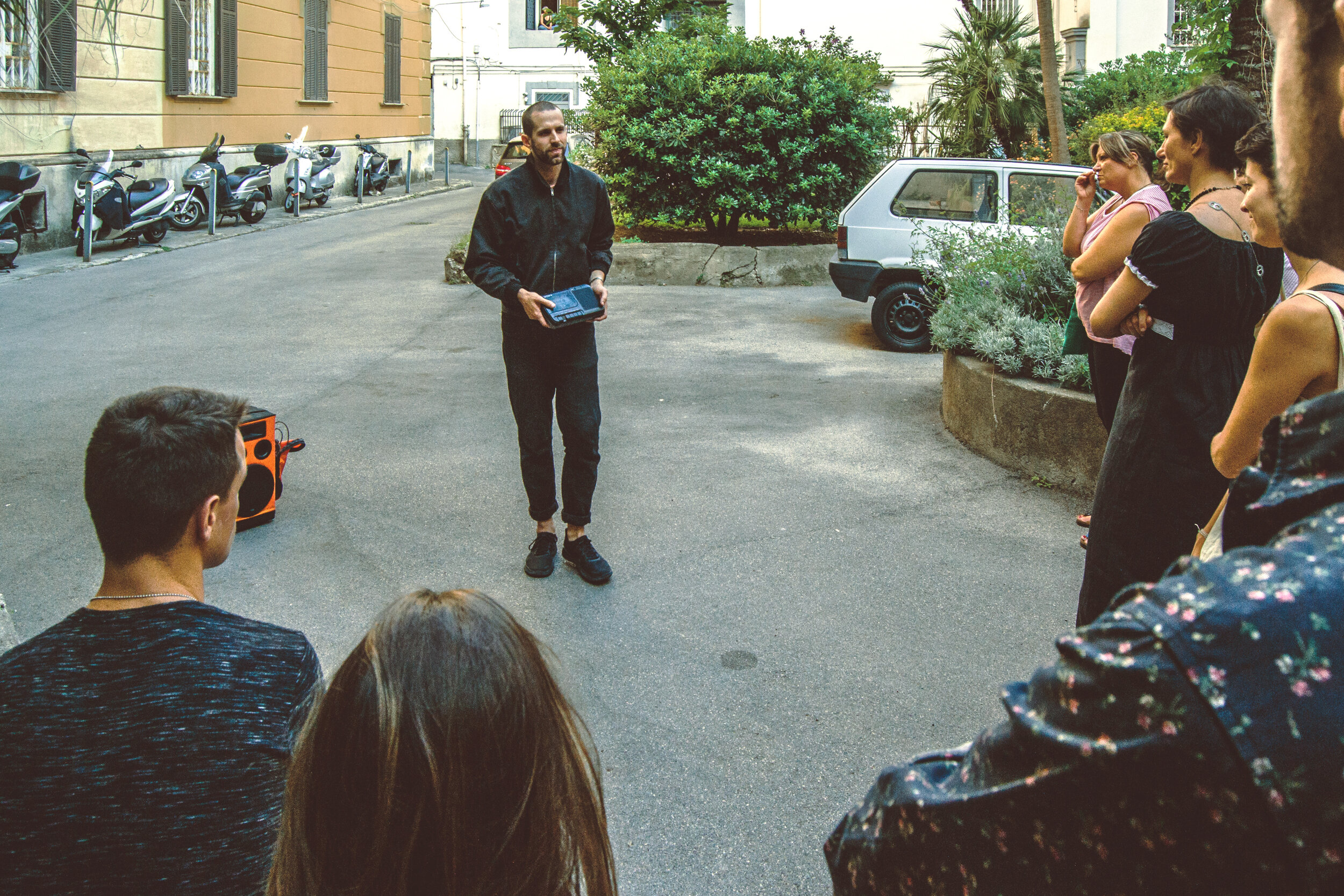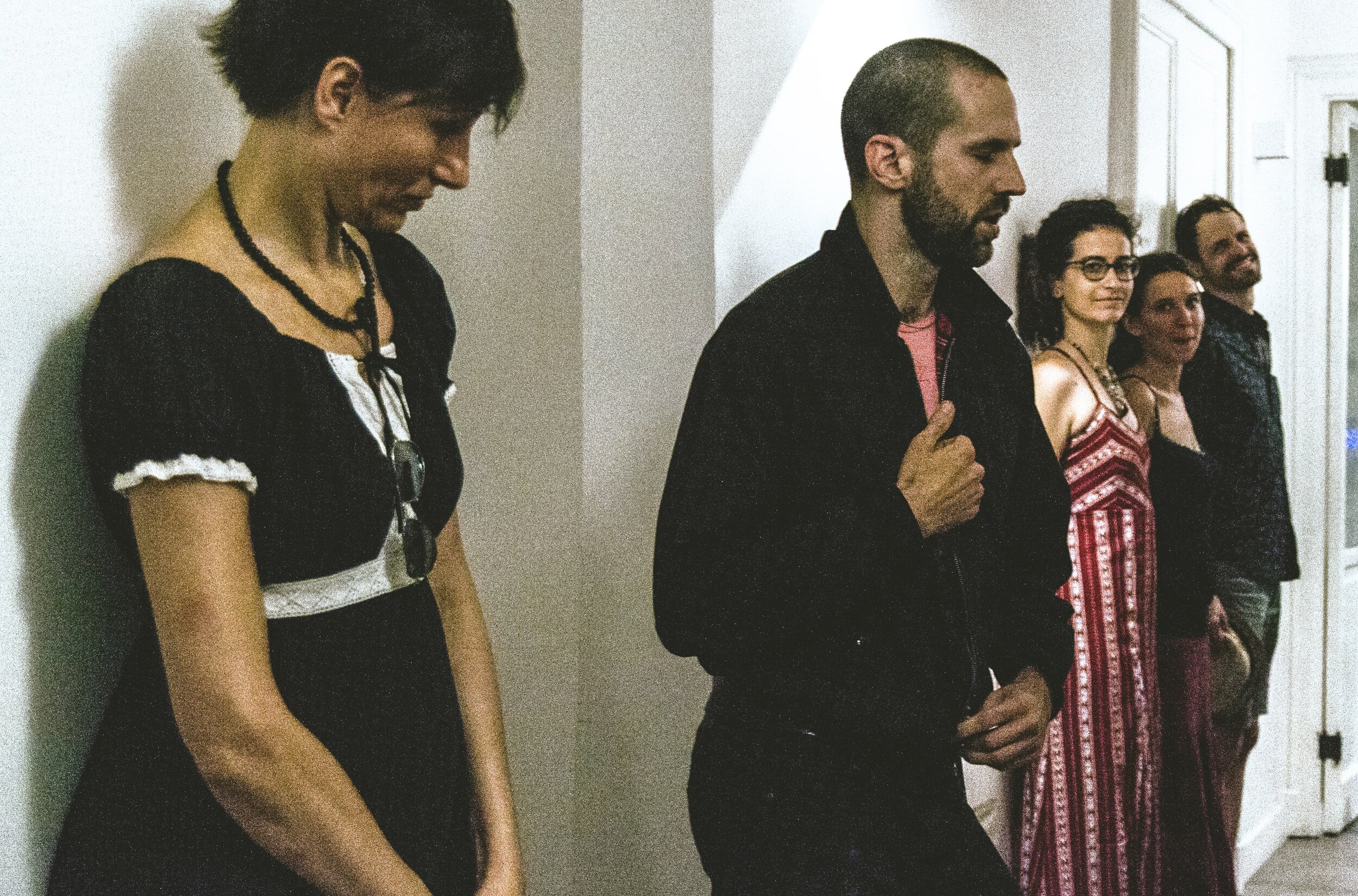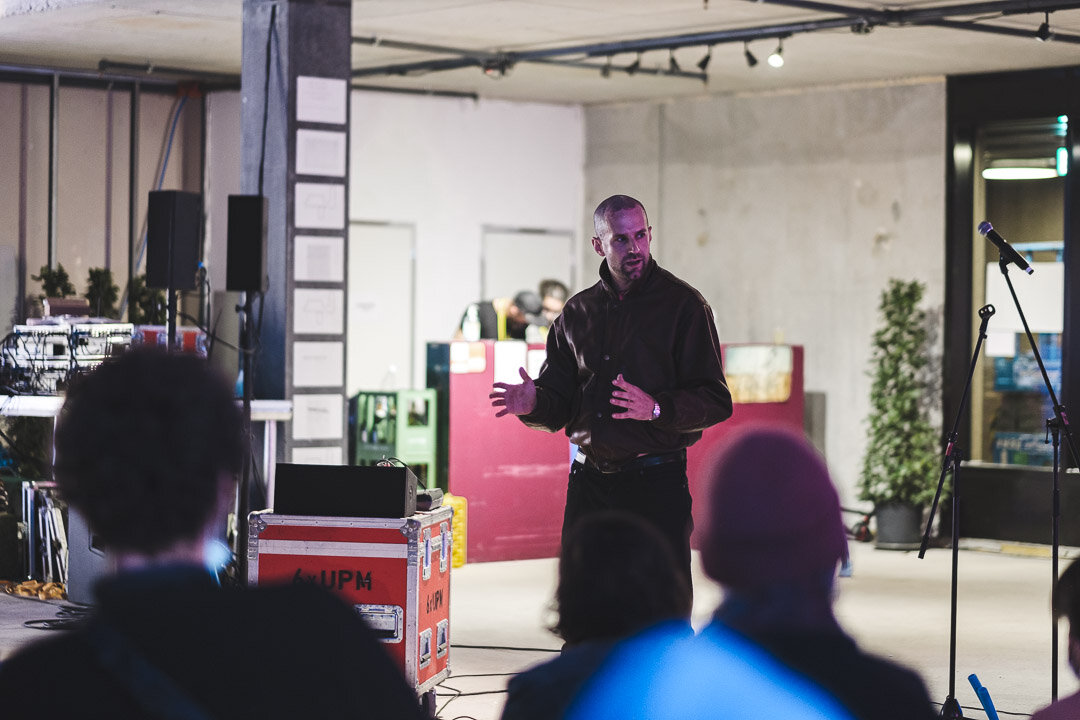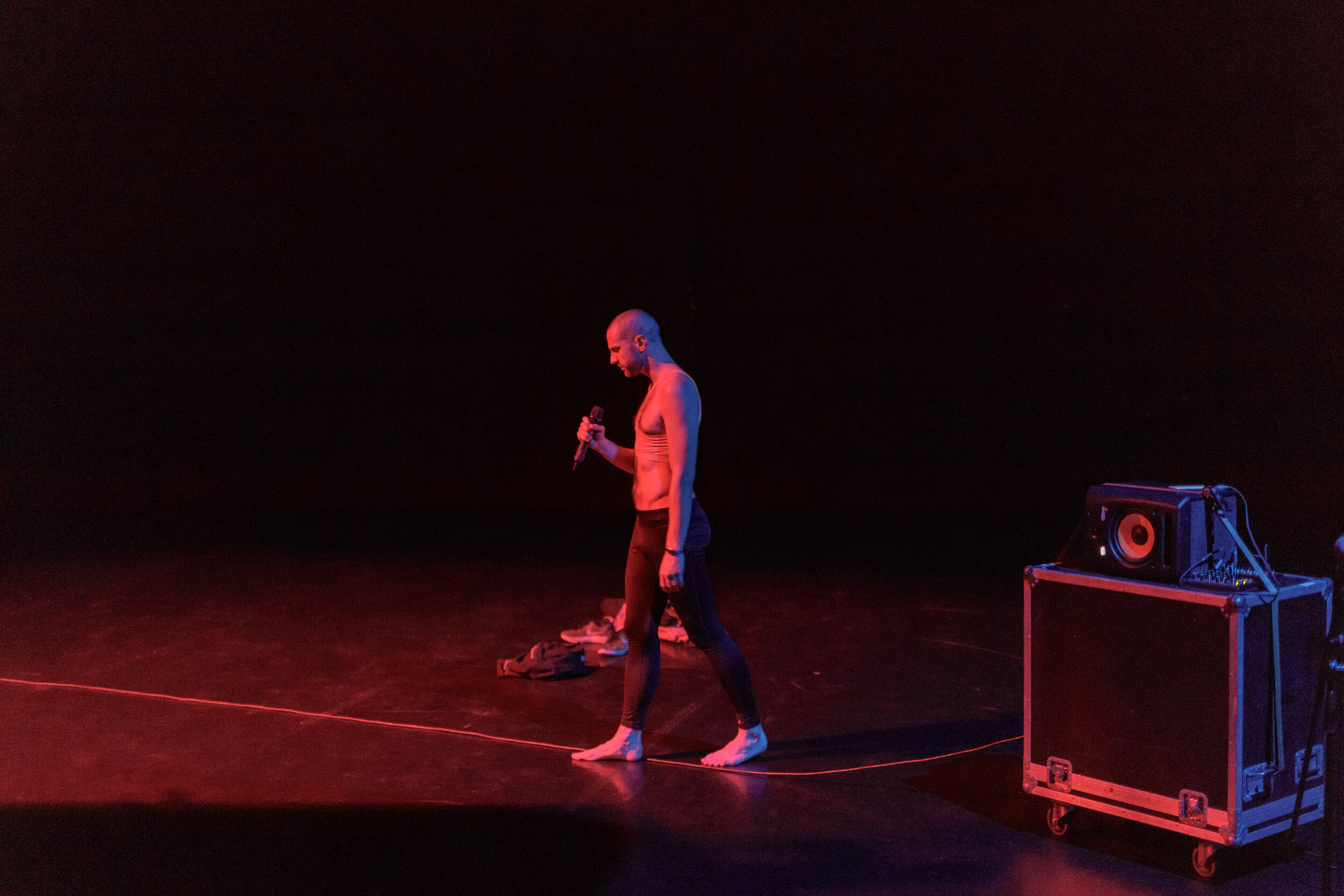“What was the last thing you rejected?”
The solo dance-performance Sublime Scum was developed in Brussels throughout 2016-2017 within the context of the Institute Supérieure d’Art et Chorégraphie (ISAC), and was the first full length dance-performance adapted for theatres, though it is designed to function both inside and outside of a black box theatre setting.
The piece comes from the desire to tell a complicated story using mainly the body. As such, Sublime Scum consists of minimal props and mostly contains songs, dances, remarks, speeches, odd interests, as well as attitudes and different kinds of bodily states. These all come together to form a loose narrative revolving around the common theme of ‘rejection’. The theme is presented as a social subject as well as a universal force, and as such the relationship with the audience also plays an important role in the show. Moments of interaction, questioning, and conversation intersect between the singing and dancing, allowing for a serious subject matter to be seen from many points of view in a light hearted and somewhat surprising manner.
Sublime Scum has been developed as a malleable and hybrid work, integrating moments that resemble a concert, a TED talk, a modern dance, a seminar and even an evening at the café. Performed in English by Swiss artist André Chapatte, the show is a more or less 45 minute solo which focuses on the notion of ‘rejection’ and the elements which surround it and leaves the public questioning how they relate to the world by not paying attention to it.
Sublime Scum is around 45 minutes long and is accompanied by music composed by Burt Bacharach, with additional music by yours truly. The show requires an active speaker with a mini-jack (for audio input) and a microphone. The microphone is used only occasionally to add some diversity, as with his loud voice the performer is able (depending on the acoustics) to properly address an audience without amplification.
Technically the piece can be presented either in a black box theatre setting (in which case raked seating and a run-through of lights with a technician is necessary) or somewhere more surprising. A large common area or the main entrance of a theatre works very well as a presentation space, as long as a large enough area is cleared for dancing and that the floor is left relatively clean. Bringing the show to a normally unspectacular setting allows for a certain sense of spectacular ‘magic’ to emerge in an unusual place. One can easily imagine visitors of a festival having a drink or perhaps passing through somewhere and suddenly realising there are chairs set out and that the power of performance art is in full display. This would encourage unexpected (and potentially rejected) perspectives to appear from the audience’s experience with the live presence.
↑ (Sublime Scum in 2017 at La Raffinerie, Charleroi Danse in Brussels. Photos by Tony Trichanh.)
Bellow is a series of extracts from an assay written in regards to rejection and the Sublime Scum, as well as photos from presentations in Malta, Naples and Geneva.
“The Sublime Scum is the inconceivable amount of people, plants, animals, objects, materials, substances, actions, ideas, directions, locations, perspectives, sources, emotions etc. that are at any given time pushed out of an individual’s perception of the world. It is the very impossibility of going to every bar in the world at the same time, of helping every single person in need, of brushing our teeth 24hrs a day, of swimming, fucking, eating and writing a partition in four countries at the same exact moment. Impossible to do, and as such there are decisions that have to be made. However, such decisions are (mostly) motivated by not having a choice within the physical world. The dismissal of countless things has a lot to do with the universal law of conservation of energy, as our brains are not designed to exponentially expand their capacity for consciousness without a whole series of inconvenient side effects (think psychedelic drugs). Even then, is it a serious declaration to say that an altered state would allow for our tiny thinking organ to absorb the near infinite amount of things which are rejected from the collective human experience? The Sublime Scum, like Timothy Morton’s hyperobjects (which include things like nuclear explosions or the weather) is inconceivably large in regards to both space and time. The scale of rejected objects/actions at any given moment is too great to be properly understood, and the amount of time that such things exist after being rejected is also inconceivable. Throwing away a toothbrush could result in an addition to a landfill, the burning and release of gases in the air, floating and disintegrating into small particles in the ocean, the list continues to near infinity and remains in all cases chronologically incomprehensible. The same goes for refusing some help washing the dishes. The energy which would have assisted in cleaning up those pots and pans will end up somewhere else, and the memory of the rejected proposal may disappear in just a few seconds.
The one notable difference in regards to Morton's hyperobjects is the Sublime Scum’s relationship to humanity. It depends on human rejection in order to exist. Without humans, there is no Scum. The weather and nuclear explosions (given the right circumstances) do not need humans in order for them to continue their massive movements through space and time. The Sublime Scum however, comes in and out of existence through its relation with humanity’s choices and language. The Sublime Scum is everything which we, as a human species, reject and have rejected, whether it be objects, actions, thoughts, ideas, or feelings. This mixture of somewhat banal objects (bits of paper, disposable packaging, chicken bones) with emotions (love, happiness, shame) and actions (the offer to start a relationship, financial support, a ride in a car) come together to form an immense, ethereal / physical, ever changing pattern, which may seem not so complicated to witness (to locate a cigarette butt is not a difficult task), but whose binding forces; rejection or the act of rejecting, multiply the complexity exponentially, to the point where perceiving its movements in its entirety becomes infeasible. Using the analogy of actual scum floating on a sea somewhere, we can imagine the various substances (pigments, plastics, soaps, etc.), whose reactions and bonds with one another vary quite considerably and who’s combinations give the scum its different textures, viscosities, shines and sometimes even effervescences. Any physical material, if broken down and left to its own path with the law of entropy, can end up as part of a conglomeration of scum. Cardboard, rust, biomass, used toothpaste, oil, pigments, a diversity of chemicals: things which may have once served a clear purpose but now only form a toxic and viscous bond with one another and should under no circumstances come into direct contact with human flesh. A respectable distance is maintained with ocean scum, even when admiring its swirling patterns and intricate colors. In comparison, the Sublime Scum, which is made up of physical and metaphysical substances, consists of actual scum but can (and does) also contain: fresh fruits and vegetables, clean mountain spring water, luxury apartments, high quality textiles, broken dreams, garbage, beauty, bus number K, used lottery tickets, a trip to the sea or even any good clean functioning shop that has been refused as the place to purchase this week’s alcohol. The Sublime Scum by nature, does not only contain toxic substances but also things that are of excellent quality, but have still been refused out of necessity. And to make things even more complex, certain things that are accepted by some humans are still rejected by others (the vast majority even). Everyone in the world is not at your local supermarket, but some people are. The Sublime Scum is as such multidimensional, existing on billions of layers at the same time. It is impossible to ignore and it constantly passes through us, whether we want it to or not. It can bring disastrous consequences but also no consequence at all. It is so constant and omnipresent that without special circumstances it is incredibly difficult to be confronted with its impact on our lives, whether individual or collective. My personal speculation is that in order to be confronted with the Scum one requires a form of simultaneous multidimensional/personal empathy, something which can not be presented as a sort of recipe. What I believe works better is rather to set a situation. Circumstances which may allow an individual to reflect and project in directions that he is familiar with, while also contemplating the relation that the Scum has through other individuals lives.”
↑ (Sublime Scum was presented in Malta for AltoFest in 2018)
“But what happens when confrontation with the Sublime Scum actually occurs? To properly perceive the Scum, one must broaden his perspectives beyond the bounds of possibility. This is where the very sublime nature of Scum comes into being. It is not the existence of the Scum itself that is sublime. It does not require our perception of it in order to exist. Rather, the only possibility for our perception of the Scum is through the sublime. The (almost) boundless nature of the Sublime Scum makes attempting to understand it an impossible task, which can only transform into ambition. A grand, lofty and exalted ambition of outstanding intellectual, spiritual and moral worth. To appreciate the transcendent excellence of the Scum requires a sincere attempt at reaching towards something impossible, at understanding something too great to be understood by the senses, in letting the Sublime Scum do its thing. It is thus of the utmost importance to comprehend that as the performer of this piece (for those who chose to be), the job is not to understand the Scum, but to perpetually try to. To trust that allowing the uncontainable nature of the Sublime Scum to overflow and overwhelm is the best way for perceiving it. I know that this direction may sound a bit like eastern mysticism or some form of magical thinking (what isn’t by the way?), but in this case it is not. It is a very pragmatic task in attempting to reveal natural forces to an audience. Forces which flow through and around our species. It is somewhat arbitrary and yet completely universal, and will exist whether cared about or not. The only moment it won't exist is when you, me and everyone else vanishes for ever.
The Sublime Scum is constant, ever changing and depends on our inevitable rejection of things in order to exist. But what can the Sublime Scum do? What is to be gained by trying to acknowledge every single substance, action or object pushed out of our lives? Well, one could argue that the Scum allows for our ability to love, as the Scum encompasses all the things that we do not love, that we do not pay attention to. If love commonly exists through exclusivity, the excluded is the Scum. Without the Scum, we could not care, we could not nurture and everything would be a horrible mixture of love and waste. We would love everything and nothing at the same time, and not in a good way. Everything we’ve ever cared for would matter no more or no less than all the rest of the shit out there. With no Sublime Scum, the thing you love the most in the entire universe would be on the same level as an expired fire extinguisher, a goat turd, a dead link on an unused e-commerce and so on, and so on. The love of your life would be completely meaningless, as well as anything else you ever placed your attention on. The Scum, in this sense, has a tangible purpose in our lives. One that allows us to hold on to something. To refuse everything else in the world (everything else!), in order to focus on one thing. In order to love something. It is around this very situation that the performance begins to build itself, even if this revelation of Love via Scum should (for dramaturgical purposes) emerge only at the very end of the show. The performer is before the audience because the Scum has allowed him to, and in this sense, he actually loves the audience.
From here on out, the construction of the show is set to allow for everything pushed away (sometimes out of functional necessity) to be seen, with all the horror and awe that naturally comes along with it. I do not have the pretense of saying that attempting such a task with a dance performance is the best way of doing this, but as somebody (an artist, let’s face it) who is innately fascinated by both images and relationships, I have assembled the dramaturgy for a show that allows for images to be presented (from both within and out of language, based on Mårten Spångberg’s statements regarding the nature of dance) and for relationships to be revealed (individual spectators’ personal relations with parts of the Scum). The show is thus a set of arbitrary circumstances, where dance, signifiers and experiences come together in order to allow for the possibility of something greater than the show itself to be seen. Within the next few pages, key elements to said circumstances will be presented, starting with one of the simplest and most useful words that I have found (in regards to the audience and directors): the word rejection. A simple notion that can be used in many ways to open the door for the Sublime Scum and to likewise allow for the audience to go through the rift, towards the encounter.”















↑ (Sublime Scum was presented both in Naples and in Malta at AltoFest in 2018)
“What was the last thing you rejected?
Was it another piece of text? Compulsive behavior? Stress eating bacon? Watching the “Hard Fat” documentary on vimeo? Taking a shower? Scratching your genitals? Having one more drink? Slacking off? Paying attention to your children? Going to watch crab fishing on YouTube? A deep breath? An call to your dentist? Working out? Filing your nails? Wearing sunglasses? Washing your phone? Calculating 4663x(34x658)+5673 by hand? Eating your cream? Touching a burrito on the street? Locking your bike to your neck? Carefully observing a street light? Typing and listening to https://sfgak.bandcamp.com/track/wow-bro into your computer? Zipping your zipper up and down repeatedly? Writing “I am I am I am” over and over into a small notebook? Scraping your foot on the concrete under a puddle? Putting a carrot deep in the weak point in your armpit? Getting into that truck over there? Finding a plane ticket to import as much lace as possible back to your home country? Selling your table mats? Chewing on a bottle cap? Masturbation to leg warmers in a window display? Vaping on a USB drive? A scroll through your social media feed?
Or perhaps the chance to take a walk outside? Maybe it was a request for attention by a loved one? The question may sound simple, but is actually difficult to answer in a completely satisfying way. Someone once told me that it's almost impossible to respond truthfully, as the first thing that comes to mind is generally too intimate and embarrassing to be said out loud. Another of the complications of the question is the fact that most of what we reject is completely forgotten. As such, answering it requires a small scramble through one’s memory in order to come up with something that has been rejected at some point or another. Relevance is also a strangely important factor: something important can serve as just as good of an answer as something completely boring and banal. A toothpick is just as relevant as someone’s eternal commitment. All values are stripped away in favor of an inevitable and universal action; pushing something out of the way in order to advance through our lives. Rejection has the potential of mixing the asinine and the intelligent, the beautiful and the repulsive, the burdensome and the easy, and to put them together in the same incomprehensible place. One might not realize so by being asked “what was the last thing you rejected” to his or her face, but as part of an audience, the diversity of answers becomes striking. And I must say that I enjoy asking the question to an audience so much. While developing the show, I found the use of the word rejection to be one of the simplest ways to allow audience members to recall or create their own pieces of narrativity. No need to say how much simpler it is than explaining what the Sublime Scum is, how it flows, where it exists, and then asking a poor soul in the audience to talk about their past relationships with it. By asking what the last thing someone rejected was, the Scum has a chance of appearing almost by itself! In this sense, the word rejection functions as a sort of soft accelerator, allowing for circumstances to be generated more smoothly than with a bulky definition. And it can also be used passively, that is to say outside of the theatrical apparatus, in order to clarify what the the show “Sublime Scum” is about. This is currently used in the technical sheet as well as in informal conversations. “What’s the show about?” - “It’s about rejection.” No need to speak of the Sublime Scum, yet it is right there: behind a single word, with the potential to overcome and to overwhelm. There is something about observing the inconvenient act of disposal that can make us potentially feel guilt. This brings us to a second layer of waste: The fact that one must not only dispose of things, but also dispose or remove as many thoughts as possible regarding the disposed thing. In this sense, it must not only be removed from one's surroundings, but also from one's own perception. Imagine a place where you would remember every banana peel you threw away? Even without taking other kinds of garbage into account, that's a hell of a lot of places, receptacles, gestures..
The Cambridge Dictionary (yes I know) simply defines rejection as “the act of refusing to accept, use or believe someone or something”. Good old uncle Google makes the definition even more brief, writing (in August 2018) “the dismissing or refusal of a proposal, idea, etc.” An almost comically short description, yet the etc. is placed in a way that is very revealing. The etc. effectively blocks the Scum, disallowing it from flooding the little description box in the Google search engine with almost everything dismissed or refused by humankind. It’s a good thing too, as it would turn your phone into a device which would scroll to infinity, attempting to display every single element the Scum contains, and in every single way the developers at Google did not want. Not only would this crash your phone, but it would probably overload all of Google’s data centers, making the platform unusable for anyone else in the world. All this to effectively say that the Scum is right behind the word rejection, if not a little bit inside of it. However, the word rejection is not the Scum. We’ve seen how the Scum moves and exists whether we indicate it or not, and words (including the word rejection) do not have much of a chance in influencing it. The word rejection is just a word. A word that points potentially towards the Scum, but is not the Scum itself. Actually, the word rejection is probably part of the Scum (you are not using all words at the same time). But other than that, it’s not much more than an indicator. This being said, it is an extremely powerful one, and in the case of this show in particular, wonderfully useful.”
↑ (Sublime Scum was presented in Geneva at the Spielact Festival in 2020)








